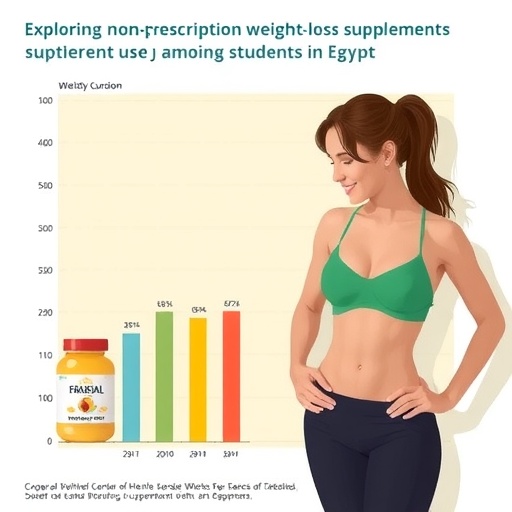An Alarming Surge in Non-Prescription Weight-Loss Supplement Use Among Egyptian University Students Raises Health Concerns
A recent groundbreaking observational study conducted at Beni-Suef University in Egypt has unveiled a worrying trend among undergraduate students: over 12% are turning to non-prescription weight-loss supplements without prior medical consultation. This phenomenon, captured through a comprehensive self-administered questionnaire, highlights significant gaps in knowledge and potentially dangerous practices among young adults striving for weight management.
Obesity is a growing global epidemic, and Egypt finds itself in the top twenty countries worldwide grappling with this issue, with an obesity prevalence nearing 40%. The proliferation of over-the-counter weight-loss supplements in this context offers a seemingly accessible shortcut for individuals seeking to shed pounds without ingrained lifestyle changes. These supplements, marketed aggressively as rapid and effortless solutions, often contain heterogeneous mixes of bioactive compounds ranging from herbs and fibers to caffeine and minerals. Their purported mechanisms include diminishing fat absorption, accelerating metabolic rates, or enhancing the feeling of fullness.
The study conducted by Nouralhoda Ahmed Abdalfattah and colleagues presents the first comprehensive assessment of Egyptian university students’ knowledge, attitudes, and behaviors regarding these supplements. While the 12.6% prevalence rate of non-prescription supplement use among undergraduates slightly exceeds global averages in the general population, it remains notably lower than rates observed in comparable sociocultural regions, such as the United Arab Emirates, suggesting regional variability linked to sociocultural and regulatory factors.
One of the most alarming findings is the relatively high incidence of adverse health events among users. Approximately 40% reported experiencing side effects, including headaches, dizziness, gastrointestinal disturbances, palpitations, and fatigue. Despite these significant health warnings, a majority of users persisted in their supplement intake. This persistence underscores a concerning disconnect between awareness of potential harm and behavioral responses, potentially aggravated by the unregulated nature of many supplements and the ease of obtaining them without prescription.
Delving further into the determinants of supplement use, the study highlights the pivotal role of social media platforms and familial influences, which impacted roughly 60% of users’ decisions to initiate supplementation. This underlines the power of digital media narratives and personal networks in shaping health behaviors among young adults. Compounding this issue, nearly 44% of users engaged in supplement consumption without seeking medical advice, signaling a worrisome trend of self-medication with insufficient professional oversight.
The biochemical composition of these weight-loss supplements varies widely, with many containing substances whose safety profiles remain inadequately characterized. Herbal extracts, for example, may interact with metabolic enzymes or other medications, leading to unforeseen toxicities or diminished therapeutic effects. Chronic intake without medical supervision increases risks of cumulative toxicity, electrolyte imbalance, or cardiovascular complications, amplifying public health concerns.
Given these findings, the investigators advocate for multifaceted interventions targeting awareness and regulatory frameworks. There is a pressing need for structured educational campaigns tailored to young adults, especially those within university environments where health literacy initiatives can be systematically integrated. Stronger regulatory enforcement is equally urgent to curtail the distribution of unapproved supplements and ensure quality control.
Dr. Abdalfattah emphasizes that empowering young adults with evidence-based knowledge is critical to mitigating undue reliance on unverified weight-loss products. University-based health programs, public health policies, and social media engagement must converge to educate and monitor this vulnerable demographic effectively. An interdisciplinary approach involving clinicians, educators, policymakers, and community leaders will be instrumental in reshaping perceptions and fostering safer weight management practices.
Beyond the immediate scope of this Egyptian cohort, the study’s implications resonate globally. The rising ubiquity of non-prescription supplements beckons international health authorities to scrutinize regulatory efficacy and to promote harmonized guidelines that prioritize consumer safety. It also calls for further research into the long-term consequences of supplement use and the underlying psychosocial drivers motivating self-medication trends.
Addressing obesity requires sustainable lifestyle modifications and clinical interventions, yet the allure of quick fixes remains seductive, especially in an era dominated by social media influence and commercialized health solutions. Bridging the gap between knowledge and behavior among young adults will be pivotal in reversing the tide of unsupervised supplement use and protecting public health worldwide.
In conclusion, the study from Beni-Suef University sheds critical light on a dangerous public health dynamic — young Egyptians’ substantial engagement with non-prescription weight-loss supplements coupled with inadequate awareness and medical oversight. The findings serve as both a call to action and a foundational base for developing strategic, evidence-informed approaches aimed at enhancing education, regulation, and ultimately, youth health outcomes in Egypt and beyond.
Subject of Research: People
Article Title: Knowledge and practice about non-prescription weight loss supplements utilization among university students
News Publication Date: 29-Sep-2025
Web References:
- International Journal of Adolescent Medicine and Health (DOI:10.1515/ijamh-2025-0124)
- Beni-Suef University
Keywords: Weight loss, Obesity, Self medication, Education, College students, Adolescents, Young people, Public health




